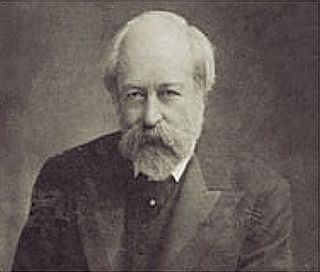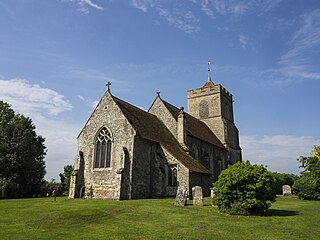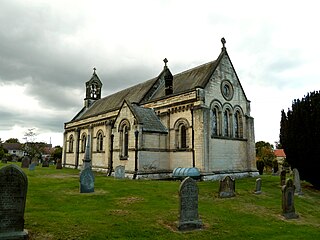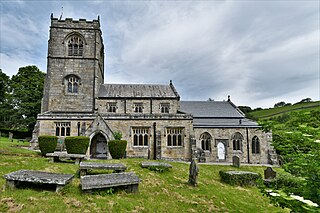
George Frederick Bodley was an English Gothic Revival architect. He was a pupil of Sir George Gilbert Scott, and worked in partnership with Thomas Garner for much of his career. He was one of the founders of Watts & Co.

St John's is a hamlet on the fringes of Redhill, Surrey, England. The small elevated residential community occupies a conservation area encircled by Earlswood and the wooded Redhill Common, which is connected along two low to mid rise streets with typically woodland-style gardens to Reigate. St John's is in its wider definition one of the three ecclesiastical parishes that make up Redhill. The area around St John's school and church had small beginnings but at one time grew so rapidly it was thought that it was the nucleus of a new town.

Holy Trinity Church is a redundant Anglican church on Low Lane in the village of Wensley, North Yorkshire, England. The building is recorded in the National Heritage List for England as a designated Grade I listed building, and is under the care of the Churches Conservation Trust. Alec Clifton-Taylor included the church in his list of 'best' English parish churches.

St John the Baptist's Church is a redundant Anglican church in the village of Strensham, Worcestershire, England. It is recorded in the National Heritage List for England as a designated Grade I listed building, and is under the care of the Churches Conservation Trust. Clifton-Taylor includes the church in his list of 'best' English parish churches.

St Denys' Church is a redundant Anglican church in the village of Little Barford, Bedfordshire, England. It is recorded in the National Heritage List for England as a designated Grade II* listed building, and is under the care of the Churches Conservation Trust.

St Andrew's Church is a redundant Anglican church in the village of Buckland, Hertfordshire, England. It is recorded in the National Heritage List for England as a designated Grade II* listed building, and is under the care of the Churches Conservation Trust. The church stands at the highest point in the village to the east of Ermine Street, now the A10 road, between Royston and Buntingford.

St Andrew's Church is a redundant Anglican church in the village of Redbourne, Lincolnshire, England. It is recorded in the National Heritage List for England as a designated Grade I listed building, and is under the care of the Churches Conservation Trust. The church stands in the centre of the village, which is to the east of the A15 road, and some 4 miles (6 km) south of Brigg.

Holy Trinity Church stands to the northeast of the village of Little Ouseburn, North Yorkshire, England. It is an Anglican parish church in the deanery of Ripon, the archdeaconry of Richmond, and the Diocese of Leeds. Its benefice is united with those of five local churches. The church is recorded in the National Heritage List for England as a designated Grade I listed building.

The Church of St James the Less is in the village of Tatham, Lancashire, England. It is an active Anglican parish church in the deanery of Tunstall, the archdeaconry of Lancaster and the diocese of Blackburn. Its benefice is united with those of St Wilfrid, Melling, St John the Baptist, Tunstall, St Peter, Leck, the Good Shepherd, Lowgill, and Holy Trinity, Wray, to form the benefice of East Lonsdale. The church is recorded in the National Heritage List for England as a designated Grade II* listed building. It stands above the flood plain of the River Wenning.

St James with Holy Trinity Church is in Seamer Road, Scarborough, North Yorkshire, England. It is an active Anglican parish church in the deanery of Scarborough, the archdeaconry of East Riding, and the diocese of York. The church is recorded in the National Heritage List for England as a designated Grade II listed building.

Holy Trinity Church, Micklegate, York is a Grade I listed parish church in the Church of England in York.

St James Church is a Church of England church in School Lane, Quedgeley, Gloucester, Gloucestershire, England. It was designated as a Grade II listed building in January 1955.

St Giles' Church is the parish church of Copmanthorpe, a suburban village in the southern part of the City of York district, in the ceremonial county of North Yorkshire, England. It is a Grade II listed building.

St Michael's Church is the parish church of Barton-le-Street, a village in North Yorkshire, in England.

St Mary's Church is the parish church of Bolton-on-Swale, a village in North Yorkshire, in England.

St Peter's Church is the parish church of Brafferton and Helperby, a village in North Yorkshire, in England.

St John the Baptist's Church is the parish church of Low Bentham, a settlement in North Yorkshire, in England.

St Thomas' Church is the parish church of Brompton, a village near Northallerton in North Yorkshire, in England.

St Wilfrid's Church is the parish church of Burnsall, a village in North Yorkshire, in England.

St Lawrence's Church is an Anglican church in Carlton Miniott, a village in North Yorkshire, in England.




















